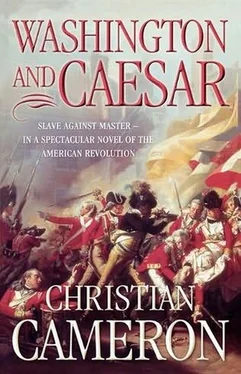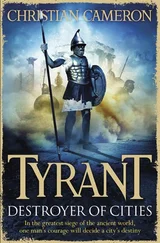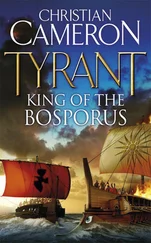Christian Cameron - Washington and Caesar
Здесь есть возможность читать онлайн «Christian Cameron - Washington and Caesar» — ознакомительный отрывок электронной книги совершенно бесплатно, а после прочтения отрывка купить полную версию. В некоторых случаях можно слушать аудио, скачать через торрент в формате fb2 и присутствует краткое содержание. Год выпуска: 0101, ISBN: 0101, Издательство: HarperCollins, Жанр: Исторические приключения, на английском языке. Описание произведения, (предисловие) а так же отзывы посетителей доступны на портале библиотеки ЛибКат.
- Название:Washington and Caesar
- Автор:
- Издательство:HarperCollins
- Жанр:
- Год:0101
- ISBN:9780007389698
- Рейтинг книги:3 / 5. Голосов: 1
-
Избранное:Добавить в избранное
- Отзывы:
-
Ваша оценка:
- 60
- 1
- 2
- 3
- 4
- 5
Washington and Caesar: краткое содержание, описание и аннотация
Предлагаем к чтению аннотацию, описание, краткое содержание или предисловие (зависит от того, что написал сам автор книги «Washington and Caesar»). Если вы не нашли необходимую информацию о книге — напишите в комментариях, мы постараемся отыскать её.
Washington and Caesar — читать онлайн ознакомительный отрывок
Ниже представлен текст книги, разбитый по страницам. Система сохранения места последней прочитанной страницы, позволяет с удобством читать онлайн бесплатно книгу «Washington and Caesar», без необходимости каждый раз заново искать на чём Вы остановились. Поставьте закладку, и сможете в любой момент перейти на страницу, на которой закончили чтение.
Интервал:
Закладка:
George didn’t ask for a second cup because he could tell Mrs. Keating was nervous to have him and unhappy to discuss the Lovells. He went back to his inn, claimed his gear and his horse, and set out on his return trip. He didn’t want to spend a night in Philadelphia if he could help it.
Betsy might be in New York, just nine miles from George’s camp. And only the British Army between us, George thought as he started north.
New York City, November 30, 1779
It was St. Andrew’s Day.
In the early afternoon the tavern hosted the party for Caesar’s wedding. This was not a common event in taverns, and the service itself, performed unflinchingly by the bride’s father, was held in an Anglican chapel up King Street a ways, so that the party had to squelch to and fro through the muddy streets. Caesar carried his bride, the length of his former master’s great cape wrapped around her so that her French silk gown, imported illegally and with a great deal of anticipation by mercantile connections of Captain Stewart, came through untouched.
Back at the Moor’s Head, all the musicians of the Guides, as well as the musicians of several line companies and two very tall pipers come early for the St. Andrew’s Day festivities, made themselves into a military band and proceeded to play with loud competence. The rafters echoed with songs both military and profane, but it was the dances that everyone would remember later.
Stewart enjoyed the rare pleasure of partnering Sally in public. He did not disgrace himself and she seemed transformed. He wanted her transformed. She spent too much time considering her shadowed future as it was. She had come in a simple gown, as if to keep her charms from rivaling those of the wedding couple.
Caesar was magnificent in a scarlet coat and half boots. He looked like a martial statue, except few statues laughed as much. The scars on his face were almost invisible when he laughed, and he laughed often. When it was his turn, he raised his glass and spoke of Polly and Reverend White, and then of Jeremy. Stewart, unprepared, could only weep. But it passed in a moment and he raised his glass, his tartan coat in contrast to the brighter colors all around him.
But it was Polly who took all eyes. The Hammond girls, the elder of them soon to be wed to Mr. Martin, arranged to arrive at a time where they might have been coming early for the St. Andrew’s Day party-a thin fiction to fool their parents-but even Poppy’s golden hair and fashion couldn’t compete with Polly’s straight back and the contrast of her complexion and the color of her gown. Polly was the most beautiful woman in the room, and perhaps in New York, and she and Caesar danced to everything, sang every song, toasted their friends and gave them something good to last the longest winter of the war.
Before darkness had fallen, most of the wedding party was back in the barracks across the street, many barely able to stand. Sergeant McDonald, who had struck up a friendship with the two pipers and felt obliged to stay for the second festivity, pronounced it the best wedding he had ever attended.
The Moor’s Head stayed full. There wasn’t room for another man or woman to fit under the rafters, and the din roared out into the street and across to the barracks there, and up to Mother Abbott’s and down to the docks. Men drank at their cards, a piper played an endless, complex pibroch while a critical crowd watched, and everywhere men sang.
Highlanders and Lowlanders and Scots by courtesy danced and sang, recited poetry or, if greatly daring, gave voice in Gaelic. Sgt. McDonald and the pair of pipers from Mull had seized the best table early and held it against all comers, proclaiming the superiority of Scotland, Alan McLean and the Hebrides to all who would listen. The eldest, a white-headed man named Cameron, declaimed from Ossian and challenged any man to tell him the great bard was a counterfeit.
After the wedding, the Scots had begun to arrive in earnest and the character of the place changed. Colonel Robinson was a late addition, along with his guest. Stewart laid himself out to be amiable, aware that he was just a shade short of drunkenness. Jeremy would have been leading him home, by now. Sally had given him a meaningful glance when she left, and that had been hours ago. He watched, and sang, and shouted, and drank more.
From time to time the door opened and brought cold and damp and newcomers, often couples coming from other parties. There were several St. Andrew’s revels in New York and it seemed that everyone in the town was Scottish.
Stewart heard the men from Mull singing “Come o’er the Stream, Charlie” and wondered how seditious the evening would become. Behind him, Robinson waved for a waiter.
“Some of your countrymen still want the Jacobite pretender, Captain?”
“Not really. Most think he’s a useless sod and a drunk. And Roman, to boot. But the resentment is still there. Aye, and some of the songs you’ll hear tonight are still illegal at home.” Stewart raised his glass. “But we were always Whigs, so I won’t drink to the King over the water. I was just born when the Prince came over and me Da’ stayed in his counting house like a proper Edinburgh gent.”
Robinson laughed. He was Virginia born, well bred, a former friend of George Washington, but he hated slavery and hated the Continental Congress, too. Some said he and Washington had fought over a woman. Whatever the truth, he had married in the north and stayed there, and now he commanded one of the better Loyalist corps. Stewart liked him well enough but he was no substitute for Simcoe, who was away in the south.
“You British make such an issue about counting houses and the like. No one in America cares. We’re all in trade.” He waved his wine glass at the room. “Could you have St. Andrew’s like this at home? No. Half these men wouldn’t be allowed in the same room as the other half.”
Stewart nodded his agreement and thought about Caesar’s wedding. He might have let the wine lead him astray, because when Stewart looked up he found that they had been joined by a family, a rotund man and his handsome wife and even handsomer daughter. The man bowed to Colonel Robinson, who rose from his chair and bowed in return.
“I took the liberty of inviting Mr. Silas Lovell, formerly of Philadelphia, and his wife to join us. Mr. Lovell is not Scots but something tells me his wife is.”
Mrs. Lovell made a face and tapped the colonel lightly with her fan.
Stewart rose to his feet and bowed.
“Mr. Lovell of the commissary, may I introduce Captain Stewart of the army.”
“Your servant, sir,” said Stewart, racking his brain for why the name of Lovell seemed so familiar.
“And yours, sir.”
“You are Scottish, Captain?” asked Mrs. Lovell.
“Born and bred in sight of Holyrood, ma’am.”
Mrs. Lovell smiled and nodded. “My family is from Aberdeen.”
Mr. Lovell winced at the pibroch, which had reached a level of intensity rivaled only by the complexity of the repetition.
“When did you come to America?” asked Stewart.
“I came as a girl, in one of my father’s ships. I’m an Ogilvy.”
Stewart bowed again. “I suspect I know your brothers, ma’am. My father is Kenneth Stewart, the Turkey merchant.”
In a moment they were off in a rush of reminiscence. Short of meeting a friend from Edinburgh or from his school days, Captain Stewart couldn’t have made a happier acquaintance. They spoke for several minutes, animated, exchanging names and laughing, until Mrs. Lovell noticed that her husband had gone off with Colonel Robinson and her daughter was standing by, somewhat listless.
“I don’t think my husband introduced my daughter, Betsy.”
Читать дальшеИнтервал:
Закладка:
Похожие книги на «Washington and Caesar»
Представляем Вашему вниманию похожие книги на «Washington and Caesar» списком для выбора. Мы отобрали схожую по названию и смыслу литературу в надежде предоставить читателям больше вариантов отыскать новые, интересные, ещё непрочитанные произведения.
Обсуждение, отзывы о книге «Washington and Caesar» и просто собственные мнения читателей. Оставьте ваши комментарии, напишите, что Вы думаете о произведении, его смысле или главных героях. Укажите что конкретно понравилось, а что нет, и почему Вы так считаете.












